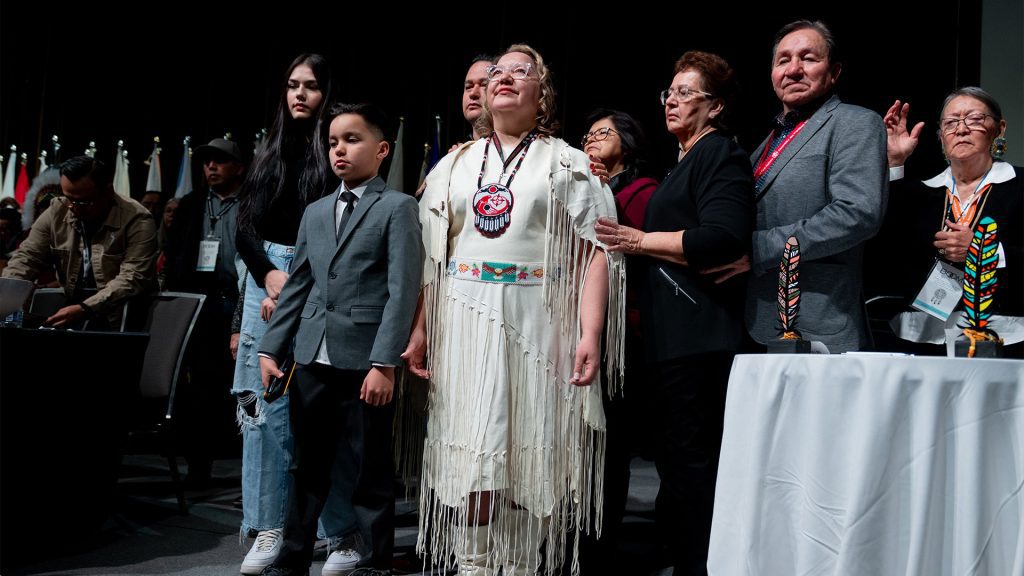
National Chief of the Assembly of First Nations Cindy Woodhouse, centre, is seen following a swearing-in ceremony during the third day of the special chiefs assembly in Ottawa. Photo: Spencer Colby/The Canadian Press.
Cindy Woodhouse is now at the helm of the national organization that represents more than 600 First Nations across the country.
Woodhouse, who was the regional chief of the Assembly of First Nations for Manitoba, was declared the winner after David Pratt conceded the election Thursday morning in Ottawa.
The victory comes after a long night of voting Wednesday that saw four of the candidates eliminated and a stalemate between Woodhouse and Pratt, a vice-chief with the Federation of Sovereign Indigenous Nations, or FSIN.
Woodhouse led in all ballots leading up to the victory.
“I’d like to thank each and every one of you for being here and foremost I want to thank the candidates,” Woodhouse started her speech. “When you’re in an election like this you spend days together and you become family. David and I had a long discussion last night and a long discussion this morning … and we came together in a good way because we have to work for you. This isn’t about us.”
Woodhouse, from Pinaymootang First Nation in Manitoba, now has the job of uniting a fractured executive committee made up of regional chiefs from across the country.
The election she won is the result of the ousting of former national chief RoseAnne Archibald – the first female to hold the job.
But Woodhouse, who was one of the chiefs who opposed Archibald at a meeting in June where she lost her job, acknowledged Archibald to unite chiefs in assembly on this day.
“I also want to thank RoseAnne Archibald because she smashed glass ceilings for all of us,” Woodhouse said. “I know things aren’t easy. I lift you up in a good way and I hope we can all come together because we have to be united in this assembly.”
Archibald alleged there was financial corruption at the AFN and pushed for a forensic audit in a move backed by the chiefs in assembly.
The AFN hasn’t moved on the audit. Woodhouse didn’t mention internal issues within the AFN – but appealed to Canadians to “support” First Nations.
“To Canada and Canadians, we need your support you have to work with First Nations people in a good way,” she said. “We are here in a good way. At the same time, there’s a point where, if you don’t listen to our people, you don’t listen to our chiefs – you don’t answer them – then there’s problems. And so to Canada, we’re coming for you.”
Woodhouse was the lead negotiator for the AFN when it was trying to reach a compensation deal with the federal government for on-reserve First Nations children who were discriminated against while in care.
The first agreement was struck down by the Canadian Human Rights Tribunal and Woodhouse publicly blamed Cindy Blackstock, the head of the First Nations Child and Family Caring Society and original complainant against the government, for the failure. Blackstock said at the time that she opposed the original deal because it left some children and families out and the tribunal agreed.
The second round of negotiations produced a $23 billion agreement to compensate all children and families affected by a child welfare system that discriminated against them. Another $20 billion is being set aside to revamp the system the tribunal ruled was discriminatory.
“We have a lot of work to do. I want to thank the chiefs who came before me. All of my chiefs are here and many of them who have left, the late chief Francis Flett, Perry Bellegarde our former national chief who I travelled with for six years from coast to coast to coast and for the past three years I’ve been working with Manitoba chiefs.”

Despite trailing by dozens of votes throughout the first six ballots, Pratt stood firm on Wednesday night and refused to concede. At one point Woodhouse walked over to Pratt on the assembly floor and asked if he was going to concede. After a short back and forth, Woodhouse walked away without a guarantee.
Thursday morning, Pratt entered the assembly by Woodhouse’s side. He said in his concession speech that Woodhouse has his complete support – and it’s time to deal with the pressing issues facing many communities.
“We’re facing a suicide, opioid, crystal meth epidemic in this country,” Pratt said, “the jails continue to be filled with our people from one end of this country to another. Our lands and resources continue to be stolen by industry working side by side with government – the issues are too important to hold back the next national chief from taking over.
“I want all of our chiefs and all of Canada, you leave here with one blurb from me, we leave here united. We leave here behind our national chief. We’re back and the future belongs to First Nations people.”
Woodhouse said that her priorities are to push for better policing, more communication between chiefs and the executive and more aggressive lobbying in Ottawa to ensure concerns are addressed in the next federal budget.
“I know we have some charter things that we have to change we’ll do that together. In my first 100 days, I committed to you that I’d be on the phone and I’ll be on the phone this afternoon because our people need housing, and our people need economic development, we need policing and justice for our communities for safe communities.”
Many chiefs at the assembly said that the biggest job for Woodhouse is to unite a fractured organization and re-establish the AFN as a force to confront the federal government over inequities for First Nations communities.
Woodhouse said to reporters that she plans on raising housing, child welfare and other issues with Prime Minister Justin Trudeau when they speak.










